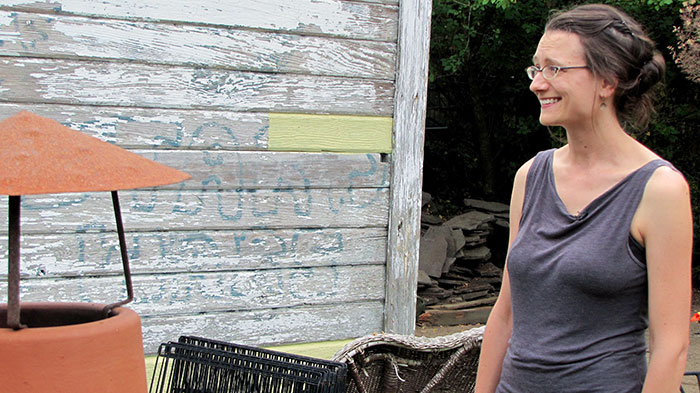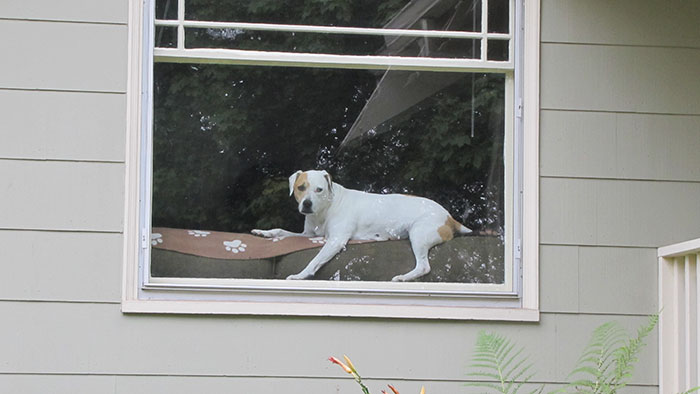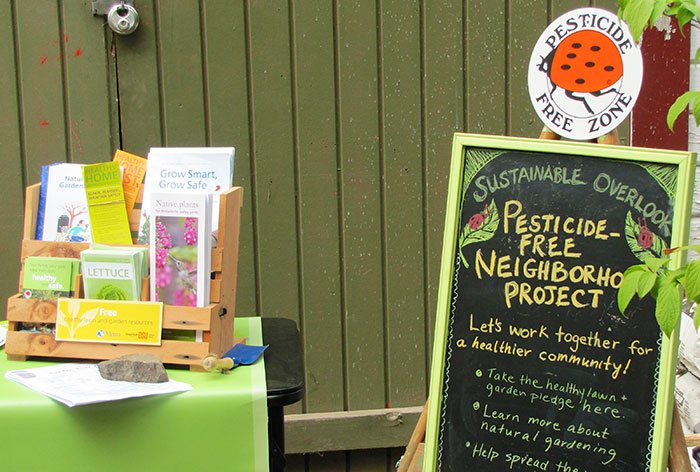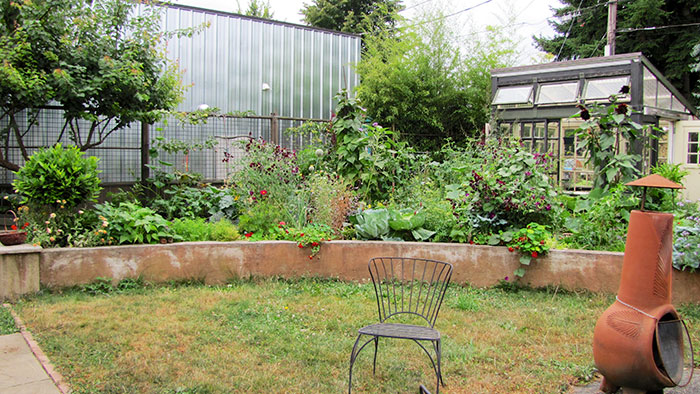For Mulysa Melco, a landscape designer who started her career working in a garden center at age 14, she was taught to enjoy and respect the outdoors as a child, and spent considerable time gardening with her parents. When Melco was 20 she started her own landscaping business, and went to graduate school to deepen her knowledge base. She moved to Portland 8 years ago, after a few years moving to the Overlook neighborhood, and eventually starting a new business focusing on homestead design.

It was during her pregnancy that Melco became concerned about the ubiquitous chemicals in her own neighborhood, the everyday stuff that people put on their lawns and garden areas that worried her the most.
Out of this concern, the Pesticide Free Overlook Project was born.

As Melco explains in the video, the main goal of the pesticide free neighborhood project is to protect residents, especially babies and young children— from chronic, low-level exposure to potentially harmful chemicals. Through a partnership with Portland Metro, The Xerces Society, and Backyard Habitat Certification Program, Melco and her team are going door to door canvasing the 2500 homes to educate homeowners. They are also reaching out to area businesses, schools, parks, and apartment complexes on ways to reduce or eliminate the use of toxic chemicals from the class of chemicals that include: synthetic fertilizers, pesticides, herbicides, and fungicides. The project is handing out printed information, hosting pesticide free garden tours, setting up information kiosks, and providing local resources on where to turn for help.

For those who are interested in reducing their own pesticide use, here are some additional information sources:
- Grow Smart Grow Safe App (an interactive app that will provide safer alternatives based upon what you are using currently on your property)
- Portland Metro Resources for Healthy Lawn and Garden
- American Academy of Pediatrics Policy Statement, Pesticide Exposure in Children
- Cosmetic Lawn Pesticide Use Outlawed in Takoma Park, Maryland-First Ban of Its Type in U.S. (Beyond Pesticides)
- Superficial Safeguards (pdf): Most Pesticides Are Approved by Flawed EPA Process (NRDC) “The public may think pesticides are only allowed onto store shelves and for use in agriculture and into consumer products if they have been approved by the U.S. Environmental Protection Agency (EPA) in a transparent and scientifically rigorous process. Recent investigations by the Natural Resources Defense Council (NRDC), however, reveal a deeply flawed system, indicating that the public’s trust is misplaced. NRDC spent several years examining federal government data and interviewing key officials, and has determined that the government has allowed the majority of pesticides onto the market without a public and transparent process and in some cases, without a full set of toxicity tests, using a loophole called a conditional registration. In fact, as many as 65 percent of more than 16,000 pesticides were first approved for the market using this loophole.”
- Natural Gardening (pdf) (a publication of Metro and the Oregon Department of Environmental Quality)

Melco readily admits that natural gardening using nontoxic alternatives requires a different mindset that respects both nature and biology: “What do we perceive as a beautiful landscape, and what is being a good steward, Melco asks?” That’s how she would like people to think about their own backyards.
While trailing behind Melco and one of her cohorts on one of their outreach excursions, one older gentlemen said he had to use a herbicide to get rid of a clover problem on his lawn. Melco nodded, as he explained, and gently offered him some of her printed handouts. She also suggested ways to seed a lawn area that reduces the weeds and unwanted plants without having to remove them later with herbicides. Afterward, I asked her about that encounter, wondering, isn’t there a more natural way to get rid of unwanted clover once the problem exists? “The solution is the problem,” Melco explained. Clover is good for the lawn, and doesn’t need to be removed. It provides nitrogen for the soil, and fertile soil provides a healthy foundation for grass to grow. In addition, Melco pointed out, bees gather pollen from clover, and farmers allow their livestock to graze on it. Changing our conception of what a lawn should look like is part of the mindset that Mulysa hopes will change.
The Pesticide Free Project has passed its 1-year mark, and has gotten 400 homes to sign the pesticide free pledge as it continues toward its second and possibly final year. When the second year ends, Melco would like to shift toward supporting the efforts of those who have made the pledge, and phase out the active campaigning to garner new pledges. Thinking toward the future, Melco says, “One of the more important things that can happen, is people getting more connected to their landscape and to nature, maybe to their neighbors in the community, as well.”
